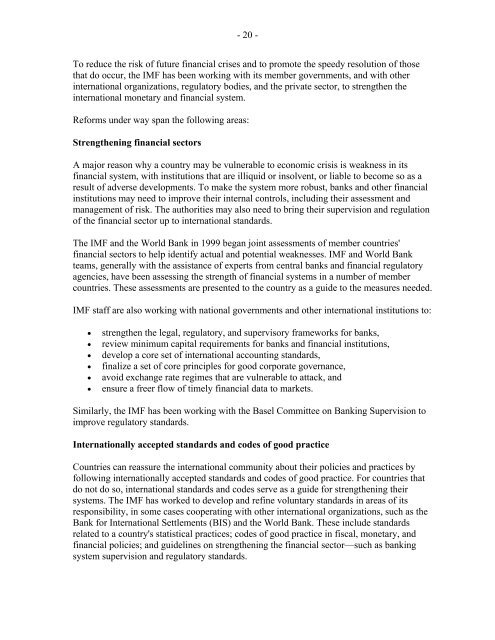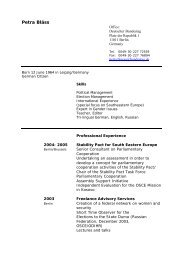What Is the International Monetary Fund? - the JVI eCampus!
What Is the International Monetary Fund? - the JVI eCampus!
What Is the International Monetary Fund? - the JVI eCampus!
Create successful ePaper yourself
Turn your PDF publications into a flip-book with our unique Google optimized e-Paper software.
- 20 -<br />
To reduce <strong>the</strong> risk of future financial crises and to promote <strong>the</strong> speedy resolution of those<br />
that do occur, <strong>the</strong> IMF has been working with its member governments, and with o<strong>the</strong>r<br />
international organizations, regulatory bodies, and <strong>the</strong> private sector, to streng<strong>the</strong>n <strong>the</strong><br />
international monetary and financial system.<br />
Reforms under way span <strong>the</strong> following areas:<br />
Streng<strong>the</strong>ning financial sectors<br />
A major reason why a country may be vulnerable to economic crisis is weakness in its<br />
financial system, with institutions that are illiquid or insolvent, or liable to become so as a<br />
result of adverse developments. To make <strong>the</strong> system more robust, banks and o<strong>the</strong>r financial<br />
institutions may need to improve <strong>the</strong>ir internal controls, including <strong>the</strong>ir assessment and<br />
management of risk. The authorities may also need to bring <strong>the</strong>ir supervision and regulation<br />
of <strong>the</strong> financial sector up to international standards.<br />
The IMF and <strong>the</strong> World Bank in 1999 began joint assessments of member countries'<br />
financial sectors to help identify actual and potential weaknesses. IMF and World Bank<br />
teams, generally with <strong>the</strong> assistance of experts from central banks and financial regulatory<br />
agencies, have been assessing <strong>the</strong> strength of financial systems in a number of member<br />
countries. These assessments are presented to <strong>the</strong> country as a guide to <strong>the</strong> measures needed.<br />
IMF staff are also working with national governments and o<strong>the</strong>r international institutions to:<br />
• streng<strong>the</strong>n <strong>the</strong> legal, regulatory, and supervisory frameworks for banks,<br />
• review minimum capital requirements for banks and financial institutions,<br />
• develop a core set of international accounting standards,<br />
• finalize a set of core principles for good corporate governance,<br />
• avoid exchange rate regimes that are vulnerable to attack, and<br />
• ensure a freer flow of timely financial data to markets.<br />
Similarly, <strong>the</strong> IMF has been working with <strong>the</strong> Basel Committee on Banking Supervision to<br />
improve regulatory standards.<br />
<strong>International</strong>ly accepted standards and codes of good practice<br />
Countries can reassure <strong>the</strong> international community about <strong>the</strong>ir policies and practices by<br />
following internationally accepted standards and codes of good practice. For countries that<br />
do not do so, international standards and codes serve as a guide for streng<strong>the</strong>ning <strong>the</strong>ir<br />
systems. The IMF has worked to develop and refine voluntary standards in areas of its<br />
responsibility, in some cases cooperating with o<strong>the</strong>r international organizations, such as <strong>the</strong><br />
Bank for <strong>International</strong> Settlements (BIS) and <strong>the</strong> World Bank. These include standards<br />
related to a country's statistical practices; codes of good practice in fiscal, monetary, and<br />
financial policies; and guidelines on streng<strong>the</strong>ning <strong>the</strong> financial sector—such as banking<br />
system supervision and regulatory standards.



